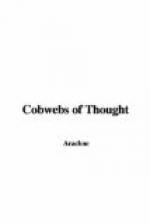must be looked for not in one book, but in the whole
tenor of her life. Does this show that her maternal
attitude was a “pose.” It is often
said that women are born wives or born mothers.
George Sand was undeniably a born mother.
Mrs. Oliphant resembled her in this respect.
They both show the deep passion of maternity in books
and autobiographies and letters. Both were devoted
to their children, there was no company they cared
for in comparison, and they spared neither trouble
or time in their interests. But George Sand cared
much, not only for her children but for the peasants—for
the poor and oppressed. Yes, and for the poets,
the painters—the singers and the musicians,
with their temperaments of genius, their loves, jealousies,
and their shattered nerves. For upwards of six
years she treated Chopin with a mother’s care;
she had the passion of maternity in her towards them
all, with whatever feelings it may have been complicated
in her life of manifold experiences and with her artist
temperament. She may have leant heavily on it
at times, it may have served as a weapon of defence
when she was attacked, and used thus it may well have
suggested a “pose.” But however used,
whatever the purpose—that the maternal instinct
was strong in her there is no denying. To explain
definitely her social and personal moral standards
requires a biography that has not yet been written.
Socially she had a hatred of feudalism, of religious
and military despotism. She sympathised with
and helped the aspirations towards a wider, a more
humane view of a social system, and fraternal equality
and social liberty were to her holy doctrines.
Perhaps fully to understand George Sand from within
may require the genius of a French mind and one of
her own generation; for the French of the present
day neither study her, or appear to care much for her
books. Her letters should aid in giving a discriminating
record of her intense and intricate life as viewed
from within, and the ideas on which that life was
lived. What then were the leading principles,
and what was the force in George Sand, which while
conquering life and harmonising it enabled her to
realise herself? If heredity influences moral
standards the mystery certainly is whence George Eliot
derived not her morality, but her “fire of insurgency.”
It is not difficult to account for it in George Sand
when we remember her mother’s life and temperament,
and her own early years. Her father was a good
soldier, but had also many literary gifts. George
Sand herself said: “Character is hereditary,
if my readers wish to know me, they must know my father.”
George Eliot’s creed and pervading view of life
was the supreme responsibility of it, and the inevitableness
of the struggles of the spirit warring against the
senses. Her ideal is attainment through great
trial. George Sand, the born hater of conventions,
developed life into a harmony. We feel ultimately
in her, a sense of peculiar serenity and peace, of




